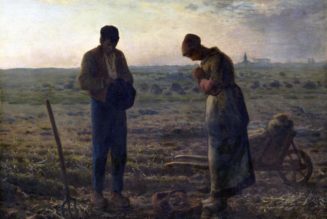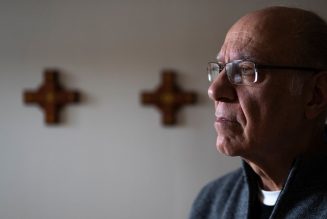
David Mills, a Contributing Editor of the NOR, has been Editor of Touchstone and Executive Editor of First Things. He writes columns for Our Sunday Visitor, the Catholic Herald, and National Catholic Register.
I’ve spent my Catholic life explaining to Catholics how their conservative Protestant friends — Evangelical, Anglican, Lutheran — can legitimately love and serve the Lord, despite being in substantial error. And despite a continuing dislike for the Catholic Church that sometimes slides into contempt.
Then I come across forms of insanely anti-Catholic conservative Evangelicalism — of the sort usually called fundamentalist — and I begin to question this work.
For example, the man who declared on Facebook, “If your celebrating Santa your celebrating Satan.” (The “your” is his.) That was bad enough, but the responses, holy cow. I don’t mean the really crazy ones, like “Santa is modern day Molech. The tree represents testicles and so on and on.” I mean the anti-Catholic ones. Because for these people, whatever goes wrong, the Catholic Church did it.
Like this one from someone who reveals that the name for the day means “the Christ-Mass.” He begins with the standard criticism, offered without a thought that the Church might not be quite so stupid as he thinks: “The Mass is contrary to scripture in Hebrews 10:12 which tells us Jesus death was a one-time offering effective forever.” Gosh. How’d we miss that?
He continues: “According to the World Book Encyclopedia 1986 and the Catholic Encyclopedia 1975 the word Christmas means ‘death of Christ.’ The impact of this fact is horrifying and shocking; for when millions of people are saying, ‘Merry Christmas,’ they are literally saying ‘Merry death of Christ’!”
You will not be surprised to know that the Catholic Encyclopedia does not say that. The writer throws in a parenthetical note at the end saying, “they are now saying it’s Latin for and means ‘to dismiss’: or Dismissal of Christ.” Not a great deal better.
To be fair, we do think differently than the fundamentalists and many Evangelicals do. The Church strives to be in the world but not of the world, but that includes appreciating the world. The world does many things well, which Catholics can value and often appropriate. The philosophers from Plato and Aristotle to Wittgenstein and Heidegger being obvious examples. Christmas trees being another.
The classic conservative Protestant mind thinks that if non-Christians (which includes Catholics) like something, it must be worldly and evil. Like this commenter on the Santa equals Satan post: “If Xmas would be of God the world wouldn’t celebrate it. Many will be celebrating a God they hate on the 25. Even atheists celebrate. So since they are unbelievers and still celebrate it that should answer many questions about Xmas of the world. Jesus said my kingdom is not of this world. Stop forcing a holy God into your worldly world. Jesus does not belong there.”
But He does. We can’t keep Him out.
The fundamentalists live in the world as comfortably as anyone else. These don’t celebrate Christmas. Others don’t dance or go to movies or otherwise reject something everyone else does. But they’re worldly in their own culturally appropriate way. They profess a very nationalistic politics, admire wealth and economic success to an inordinate degree, support all kinds of discrimination, complain about Hollywood’s morals, and love the NFL and the college football industrial complex — massive entertainment industries that are no less morally compromised.
In most ways, the fundamentalists can’t be distinguished from their secular neighbors.
Dorothy Day’s cause for canonization has been sent to Rome. It gives American Catholics a cause to cheer — and to change. She presents a challenge most of us haven’t come close to meeting. We’re not all that different from the fundamentalists.
Whether American society improves or declines (however you define it), Day’s witness and her words challenge us to live in it at some distance and at an angle. Like the fundamentalists, we like to think ourselves as aliens and pilgrims in the world, in the world but not of it, and our evidence is often the ways we stick out: being pro-life, going to church, believing in absolute truth, staying away from certain forms of entertainment, refusing to support companies that make things they shouldn’t.
All good things, but we’re still not exactly disengaged from the world. We’ve just separated ourselves from its most egregious errors. The ones we see, that is, the ones we see so easily because we don’t benefit from them. But how easily can we be distinguished from our secular neighbors? In the errors we don’t see?
This observation of Day’s, from a Catholic Worker article in 1934, haunts me, because I don’t have a good answer to her question.
“We accept by faith the mystery of the Trinity,” she writes. “We accept by faith the Holy Eucharist. When Christ says, ‘This is My Body,’ we as Catholics believe. We believe many a hard saying, so why not believe those words — ‘Seek you first the kingdom of heaven and all these things shall be added unto you…. Your Father knoweth that you have need of all those things…. What man is there among you, of whom if his son ask bread, will reach him a stone?… If you, then, being evil, know how to give good gifts to your children, how much more will your Father, Who is in heaven, give good things to them that ask Him’?”
Why not believe these words? Speaking for myself: Because I’d have to give up too much. The ways we stick out I mentioned don’t cost me much, if anything. I like going to Mass, and I appreciate having a commitment that anchors my week and helps me order my life. I was pro-life even in my secularish youth because I saw the unborn child as a human person, and you can’t kill human persons. Trying to direct my consumption to avoid supporting companies that do evil is another thing I did in my youth — boycotts are part of life in a college town — and it doesn’t actually cost me much because I can usually get what I want from another company.
It’s easy for me to be a Christian in America. Others, more out in the world, face more challenges, and some are severe. (And some, I think, are invented.) But even with those exceptions, it’s easy for most Christians to be Christians in America.
The apothegm is usually given as lex orandi, lex credendi. Pope Pius XI, in his encyclical creating the Feast of Christ the King, Quas Primas, gives it as legem credendi lex statuat supplicandi, referring to it as “the axiom,” as if this were the usual form. I don’t have any point, just passing this on for those it might interest.
I take the axiom to mean, for the Church, that what we say in the Church’s rites and what we confess in her teaching say the same thing in two ways, and that each illumines and explains the other. And for individuals, that whatever we say we believe, what we pray reveals what we really believe, and that we must work to bring the two into agreement.
I don’t know to what news story I was referring when I wrote four years ago, “Grimly amusing are those happy descendants of the English and Swiss Reformers expressing shock and horror that a Muslim would smash a statue of the Blessed Virgin.”
But then (this is me, today) no one is really an iconoclast. The “iconoclast” just adores different icons, and they may well be intellectual or ideological instead of physical. The original Calvinists hated devotion to Our Lady and the saints. They smashed statues of Our Lady and the saints. Now, the hardcore ones hate Islam. So they object to Muslims doing what good Calvinists should do.
In other words, an iconoclast is someone who smashes other peoples’ icons.
We need to think harder about what temptations social changes present, and the opportunities. As our society polarizes and Christians feel more marginalized (whether or not they really are), we’ll naturally want to show more signs of distinction. A secularizing society gives religious people two choices: go along or stand still and thereby stand out, and increasingly stand out as everyone else moves farther away.
But what kind of signs will we give? We can’t help putting up signs that say, “We’re not one of you,” just by doing what we need to do, by being ourselves. Most people feeling themselves marginalized and refusing to give in want to put up such signs. Often very big ones. Sometimes very rude ones.
We have a Gospel to preach, though, not just a home to defend. The signs must say not only, “We’re not one of you,” but “Come and see.” And “We’re not one of you, but we want you to be one of us.” We’re not so good at those signs, I think.
From the letters to the editor section of The Daily Telegraph. Anglican minister Philip Ursell, once fellow of St. Cross College, Oxford, writes that shortly after its founding, the college told the King of Saudi Arabia it would rename itself King’s College if he gave them a lot of money. The king responded, “How could you consider bartering the most sacred symbol of your religion for money?”
After leaving the Church a very long time ago, the writer Marina Warner “used to feel very distressed at religious rituals, or even by religious music, because I had once been able to surrender to them wholly and feel all that consolation and safety and joy, but had now exiled myself.” She’s best known, still, as the author of Alone of All Her Sex: The Myth and Cult of the Virgin Mary, published in 1976. She’s being interviewed in The New York Review of Books, for whom she’s written a great deal.
The interviewer explains that Warner “has gradually come to a dispassionate appreciation of religious art.” That isn’t true. The faith she left still haunts her. “I find I can almost now enjoy Christianity as if it were just another source of wonderful mythology,” she says, in the very next sentence. Almost.
“I have no belief at all in the story of Christian salvation,” she declares. And yet: “You could say I fear its spell, so am much happier with stories that don’t ask me to consent to their principles or believe in their heroes.”
She does like to have a Christmas tree, to enjoy the pine smell. But that’s okay. It’s “a pagan ritual!” she says.
Lent starts soon, and the Ash Wednesday homily may be the only time all year we hear a pastoral word about fasting. Unfortunately, many priests will appeal to the natural human baseline, which explains why so much teaching and writing on all sorts of subjects feels compromised.
Few priests or writers speak of fasting without making sure you know it’s good for you. It’ll help you lose weight, feel better about yourself, teach you a little self-discipline. But few speak of fasting in the stark way Jesus did. You fast as a sacrifice to God. You should fast even if it’s bad for you.
These priests and writers may know we fast as a sacrifice. They also know that truth doesn’t preach. They must sell fasting, not just invoke Jesus’ example and direction. Their people and their readers need to hear something that fits fasting into the lives they’re leading.
Almost every affluent American feels he can afford to lose a few pounds. He doesn’t feel he should sacrifice his pleasures for Jesus.
At night Bl. Charles de Foucauld slept for three hours, got up at midnight to pray for an hour, and then went back to sleep for three hours. He called that hour “a very sweet moment, alone with the Spouse, in the profound silence of the Sahara, under the vast sky, this hour of tête-à-tête is a supreme comfort.”
Of what Bl. Charles did when he was taken from his beloved midnight prayer, his biographer wrote, “The work of charity alone upset the Rule…. He was one who gave a fraternal welcome to the poorest and most unknown and undeserving of neighbours, who never let it be suspected that he was put out, and was willing to waste his time for talking with God upon unreliable nomads, corrupt slaves, beggars and bores. Every minute somebody would come and open the door, and Brother Charles appeared with his beautiful eyes full of serenity, his head bent forward a little, and his hand already held out.”
Not everyone recognized his kind of witness. It wasn’t, some thought, explicit enough. He wore a white tunic called a gandourah, and his belt had a red cloth heart (the Sacred Heart) with a red cross on top. He wore a cap from which he had ripped the peak and added a cloth to cover the back of his neck. Apparently, you could tell him a mile away.
After he died, a friend who’d aided him, General Laperrine, read an article claiming Charles didn’t talk much about his faith. His biographer writes that Laperrine “seized his pen and angrily scribbled in his notebook: ‘What of his conversations? and his dress?’ He wrote the truth: his habit was a sermon and, besides, Brother Charles’s whole life proclaimed the Gospel. The natives were never mistaken about it.”
Join Our Telegram Group : Salvation & Prosperity








